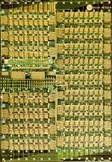My research focuses on building microsystems and nanosystems. I specialize in the following areas:
-
Interconnect Structures and Circuits. High-density, high-speed and low-power on-chip and intra-chip interconnect circuits and structures. Applications that benefit from high bandwidth interconnect, and SOP design techniques. This topic includes the following projects:
- AC Coupled Interconnect. Novel contactless, high bandwidth, low-power packaging structures and circuits for chip packaging, sockets and connectors.
- On-chip interconnect. Using on-chip equalization for the design of low-power repeaterless global on-chip interconnect. Past work includes other techniques for low-power interconnect design, and development of on-chip measurement techniques.
- 3D ICs and Packaging. The design, and CAD support, for 3D (stacked) ICs and multi-chip packages.
- Nanointerconnect. A nanofabrciated interconnect structures capable of sub-25 nm features.
- Chip-Package Codesign. Methdologies and tools for codesign of chips, packages, and multichip modules. Includes ongoing support for IO macromodeling, including Spice2Ibis.
-
Application Specific Processors and Microsystems. ASICs, SOCs and SOPs with an emphasis on novel hardware algorithms and design methodology for high performance systems. By "microsystems" I am referring to the design, and incorporation non-chip technologies, such as MEMS ("micromachining").
- Hardware for Network Security. Hardware support for line-rate network security, including filters (e.g. Snort), firewalls, and anomoly detection.
- Hardware for Network Routing. Hardware support for efficient implementaiton of IP lookup tables.
- Low-power Speech Recognition. Design of low-power speech recognition IC.
- SOI radio design. Design of a VHF radio for sensor networks.
- MEMS Varactor. MEMS structure for RF varactor (tunable capacitor).
- Novel MEMS Applications. Exploration of MEMS applicatoins outside of RF.
- Past Projects include low-power memory design, high perofrmance actuators, and CAD for low-power and reconfigurable computing.
-
Nanocomputing. Concepts for computation beyond the end of CMOS scaling. Includes devices, interconnect structures and circuit/architecture concepts.
- Molecular Computing. Structures and circuits for molecular computing.
- Nanowire fabrication.. A nanofabrciated interconnect structures capable of sub-25 nm features.
- Other Nanocomputing devies and structures.
